2019年高考全国卷2 英语
2019 英语高考真题 全国卷二 试题+答案 word 版
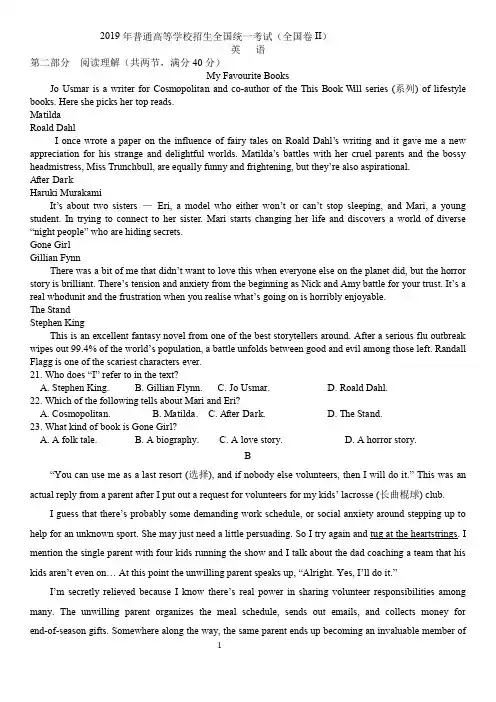
2019年普通高等学校招生全国统一考试(全国卷II)英语第二部分阅读理解(共两节,满分40分)My Favourite BooksJo Usmar is a writer for Cosmopolitan and co-author of the This Book Will series (系列) of lifestyle books. Here she picks her top reads.MatildaRoald DahlI once wrote a paper on the influence of fairy tales on Roald Dahl’s writing and it gave me a new appreciation for his strange and delightful worlds. Matilda’s battles with her cruel parents and the bossy headmistr ess, Miss Trunchbull, are equally funny and frightening, but they’re also aspirational.After DarkHaruki MurakamiIt’s about two sisters —Eri, a model who either won’t or can’t stop sleeping, and Mari, a young student. In trying to connect to her sister. Mari starts changing her life and discovers a world of diverse “night people” who are hiding secrets.Gone GirlGillian FynnThere was a bit of me that didn’t want to love this when everyone else on the planet did, but the horror story is brilliant. There’s tension and anxiety from the beginning as Nick and Amy battle for your trust. It’s a real whodunit and the frustration when you realise what’s going on is horribly enjoyable.The StandStephen KingThis is an excellent fantasy novel from one of the best storytellers around. After a serious flu outbreak wipes out 99.4% of the world’s population, a battle unfolds between good and evil among those left. Randall Flagg is one of the scariest characters ever.21. Who does “I” refer to in the text?A. Stephen King.B. Gillian Flynn.C. Jo Usmar.D. Roald Dahl.22. Which of the following tells about Mari and Eri?A. Cosmopolitan.B. Matilda.C. After Dark.D. The Stand.23. What kind of book is Gone Girl?A. A folk tale.B. A biography.C. A love story.D. A horror story.B“You can use me as a last resort (选择), and if nobody else volunteers, then I will do it.” This was an actual reply from a parent after I put out a request for volunteers for my kids’ lacrosse (长曲棍球) club.I guess that there’s probably some demanding work schedule, or social anxiety around stepping up to help for an unknown sport. She may just need a little persuading. So I try again and tug at the heartstrings. I mention the single parent with four kids running the show and I talk about the dad coaching a team that his kids aren’t even on… At this point the unwilling parent speaks up, “Alright. Yes, I’ll do it.”I’m secretly relieved because I know there’s real power in sharing volunteer responsibilities among many. The unwilling parent organizes the meal schedule, sends out emails, and collects money for end-of-season gifts. Somewhere along the way, the same parent ends up becoming an invaluable member ofthe team. The coach is able to focus on the kids while the other parents are relieved to be off the hook for another season. Handing out sliced oranges to bloodthirsty kids can be as exciting as watching your own kid score a goal.Still, most of us volunteers breathe a sigh of relief when the season comes to a close. That relief is coupled with a deep understanding of why the same people keep coming back for more: Connecting to the community (社区) as you freely give your time, money, skills, or services provides a real joy. Volunteering just feels so good.In that sense, I’m pretty sure volunteering is more of a selfish act than I’d freely like to admit. However, if others benefit in the process, and I get some reward too, does it really matter where my motivation lies?24. What can we infer about the parent from her reply in paragraph 1?A. She knows little about the club.B. She isn’t good at sports.C. She just doesn’t want to volunteer.D. She’s unabl e to meet her schedule.25. What does the underlined phrase “tug at the heartstrings” in paragraph 2 mean?A. Encourage teamwork.B. Appeal to feelings.C. Promote good deeds.D. Provide advice.26. What can we learn about the parent from paragraph 3?A. She gets interested in lacrosse.B. She is proud of her kids.C. She’ll work for another season.D. She becomes a good helper.27. Why does the author like doing volunteer work?A. It gives her a sense of duty.B. It makes her very happy.C. It enables her to work hard.D. It brings her material rewards.CMarian Bechtel sits at West Palm Beach’s Bar Louie counter by herself, quietly reading her e-book as she waits for her salad. What is she reading? None of your business! Lunch is Bechtel’s “me” time. And like more Americans, she’s not alone.A new report found 46 percent of meals are eaten alone in America. More than half (53 percent) have breakfast alone and nearly half (46 percent) have lunch by themselves. Only at dinnertime are we eating together anymore, 74 percent, according to statistics from the report.“I prefer to go out and be out. Alone, but together, you know?” Bechtel said, looking up from her book. Bechtel, who works in downtown West Palm Beach, has lunch with coworkers sometimes, but like many of us, too often works through lunch at her desk. A lunchtime escape allows her to keep a boss from tapping her on the shoulder. She returns to work feeling energized. “Today, I just wanted some time to myself,” she said.Just two seats over, Andrew Mazoleny, a local videographer, is finishing his lunch at the bar. He likes that he can sit and check his phone in peace or chat up the barkeeper with whom he’s on a first-name basis if he wants to have a little interaction (交流). “I reflect on how my day’s go ne and think about the rest of the week,” he said. “It’s a chance for self-reflection, You return to work recharged and with a plan.”That freedom to choose is one reason more people like to eat alone. There was a time when people may have felt awkward about asking for a table for one, but those days are over. Now, we have our smartphones to keep us company at the table. “It doesn’t feel as alone as it may have before all the advances in technology,” said Laurie Demeritt, whose company provided the statisti cs for the report.28. What are the statistics in paragraph 2 about?A. Food variety.B. Eating habits.C. Table manners.D. Restaurant service.29. Why does Bechtel prefer to go out for lunch?A. To meet with her coworkers.B. To catch up with her work.C. To have some time on her own.D. To collect data for her report.30. What do we know about Mazoleny?A. He makes videos for the bar.B. He’s fond of the food at the bar.C. He interviews customers at the bar.D. He’s familiar with the barkeep er.31. What is the text mainly about?A. The trend of having meals alone.B. The importance of self-reflection.C. The stress from working overtime.D. The advantage of wireless technology.DBacteria are an annoying problem for astronauts. The microorganisms (微生物) from our bodies grow uncontrollably on surfaces of the International Space Station, so astronauts spend hours cleaning them up each week. How is NASA overcoming this very tiny big problem? It’s turning to a bunch of high school kids. But not just any kids. It is depending on NASA HUNCH high school classrooms, like the one science teachers Gene Gordon and Donna Himmelberg lead at Fairport High School in Fairport, New York.HUNCH is designed to connect high school classrooms with NASA engineers. For the past two years, Gordon’s students have been studying ways to kill bacteria in zero gravity, and they think they’re close to a solution (解决方案). “We don’t give the students any breaks. They have to do it just like NASA engineers,” says Florence Gold, a project manager.“There are no tests,” Gordon says. “There is no graded homework. There almost are no grades, other than ‘Are you working towards your goal?’ Basically, it’s ‘I’ve got to produce this product and then, at theend of the year, pre sent it to NASA.’ Engineers come and really do an in-person review, and…it’s not a very nice thing at times. It’s a hard business review of your product.”Gordon says the HUNCH program has an impact (影响) on college admissions and practical life skills. “These kids are so absorbed in their studies that I just sit back. I don’t teach.” And that annoying bacteria? Gordon says his students are emailing daily with NASA engineers about the problem, readying a workable solution to test in space.32. What do we know about the bacteria in the International Space Station?A. They are hard to get rid of.B. They lead to air pollution.C. They appear in different forms.D. They damage the instruments.33. What is the purpose of the HUNCH program?A. To strengthen teacher-student relationships.B. To sharpen students’ communication skills.C. To allow students to experience zero gravity.D. To link space technology with school education.34. What do the NASA engineers do for the students in the program?A. Check their product.B. Guide project designs.C. Adjust work schedules.D. Grade their homework.35. What is the best title for the text?A. NASA: The Home of AstronautsB. Space: The Final Homework FrontierC. Nature: An Outdoor ClassroomD. HUNCH: A College Admission Reform第二节(共5小题;每小题2分,满分10分)根据短文内容,从短文后的选项中选出能填入空白处的最佳选项。
2019年高考英语全国卷2(附参考答案及详解)
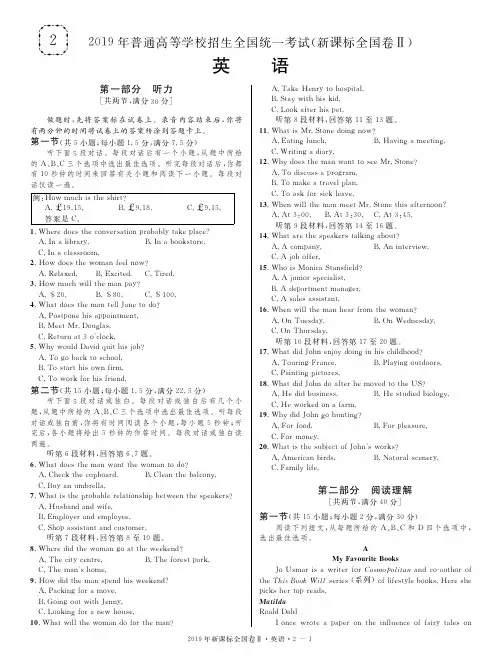
E7-/>@>76<5>E567B@05-05>76\0645E-7=-A0<56674E-7/F
?3;4MA>17-446 #长 曲 棍 球 $1A0H'
B G0644 52>5 52676M4 @7-H>HAF 4-/6 ;6/><;3<G .-7?
4126;0A6&-74-13>A><K365F>7-0<;456@@3<G0@5-26A@E-7><
)'!"#$"%"&'()*'
*'0)('&1)'
+'23(456)5.'
N'+,47()*1'
"#':2>5?3<;-EH--?348"*48'5&*
)')E-A?5>A6'
*')H3-G7>@2F'
+')A-=645-7F'
N')2-77-745-7F'
I
-X-01><046/6>4>A>45764-75 #选 择 $&><;3E<-H-;F 6A46=-A0<56674&526<B.3AA;-35'.D234 .>4><>150>A76@AF
)')Q0<3-74@613>A345'
*');6@>75/6<5/><>G67'
(精校版)2019年全国2卷英语高考试卷(含答案)
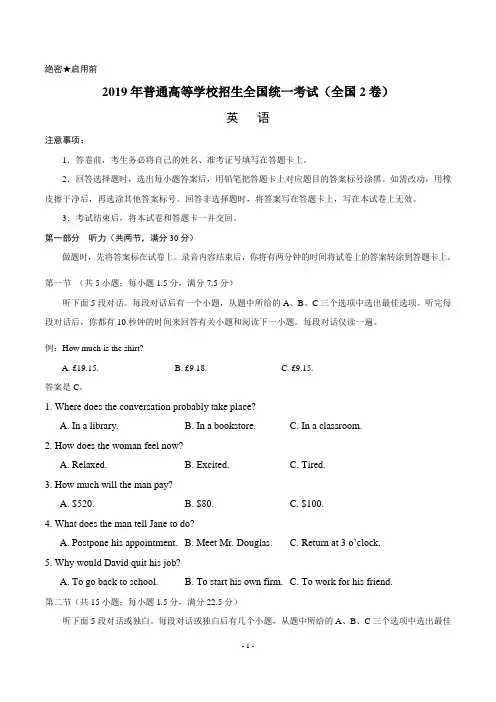
绝密★启用前2019年普通高等学校招生全国统一考试(全国2卷)英语注意事项:1.答卷前,考生务必将自己的姓名、准考证号填写在答题卡上。
2.回答选择题时,选出每小题答案后,用铅笔把答题卡上对应题目的答案标号涂黑。
如需改动,用橡皮擦干净后,再选涂其他答案标号。
回答非选择题时,将答案写在答题卡上,写在本试卷上无效。
3.考试结束后,将本试卷和答题卡一并交回。
第一部分听力(共两节,满分30分)做题时,先将答案标在试卷上。
录音内容结束后,你将有两分钟的时间将试卷上的答案转涂到答题卡上。
第一节(共5小题;每小题1.5分,满分7.5分)听下面5段对话。
每段对话后有一个小题,从题中所给的A、B、C三个选项中选出最佳选项。
听完每段对话后,你都有10秒钟的时间来回答有关小题和阅读下一小题。
每段对话仅读一遍。
例:How much is the shirt?A. £19.15.B. £9.18.C. £9.15.答案是C。
1. Where does the conversation probably take place?A. In a library.B. In a bookstore.C. In a classroom.2. How does the woman feel now?A. Relaxed.B. Excited.C. Tired.3. How much will the man pay?A. $520.B. $80.C. $100.4. What does the man tell Jane to do?A. Postpone his appointment.B. Meet Mr. Douglas.C. Return at 3 o’clock.5. Why would David quit his job?A. To go back to school.B. To start his own firm.C. To work for his friend.第二节(共15小题;每小题1.5分,满分22.5分)听下面5段对话或独白。
(真题)2019年全国卷Ⅱ英语高考试题文档版(附答案)
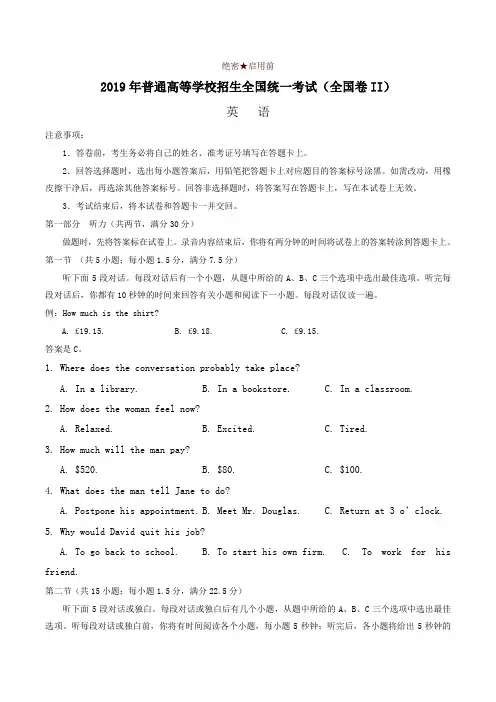
绝密★启用前2019年普通高等学校招生全国统一考试(全国卷II)英语注意事项:1.答卷前,考生务必将自己的姓名、准考证号填写在答题卡上。
2.回答选择题时,选出每小题答案后,用铅笔把答题卡上对应题目的答案标号涂黑。
如需改动,用橡皮擦干净后,再选涂其他答案标号。
回答非选择题时,将答案写在答题卡上,写在本试卷上无效。
3.考试结束后,将本试卷和答题卡一并交回。
第一部分听力(共两节,满分30分)做题时,先将答案标在试卷上。
录音内容结束后,你将有两分钟的时间将试卷上的答案转涂到答题卡上。
第一节(共5小题;每小题1.5分,满分7.5分)听下面5段对话。
每段对话后有一个小题,从题中所给的A、B、C三个选项中选出最佳选项。
听完每段对话后,你都有10秒钟的时间来回答有关小题和阅读下一小题。
每段对话仅读一遍。
例:How much is the shirt?A. £19.15.B. £9.18.C. £9.15.答案是C。
1. Where does the conversation probably take place?A. In a library.B. In a bookstore.C. In a classroom.2. How does the woman feel now?A. Relaxed.B. Excited.C. Tired.3. How much will the man pay?A. $520.B. $80.C. $100.4. What does the man tell Jane to do?A. Postpone his appointment.B. Meet Mr. Douglas.C. Return at 3 o’clock.5. Why would David quit his job?A. To go back to school.B. To start his own firm.C. To work for his friend.第二节(共15小题;每小题1.5分,满分22.5分)听下面5段对话或独白。
2019年英语全国2卷真题及答案
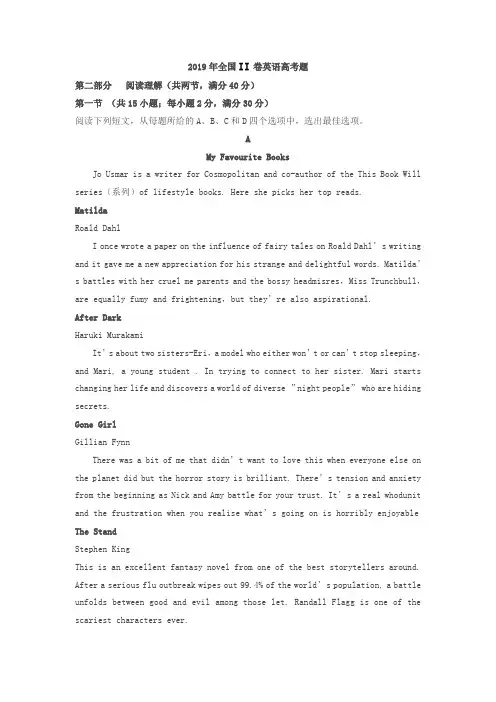
2019年全国II卷英语高考题第二部分阅读理解(共两节,满分40分)第一节(共15小题;每小题2分,满分30分)阅读下列短文,从每题所给的A、B、C和D四个选项中,选出最佳选项。
AMy Favourite BooksJo Usmar is a writer for Cosmopolitan and co-author of the This Book Will series(系列)of lifestyle books. Here she picks her top reads.MatildaRoald DahlI once wrote a paper on the influence of fairy tales on Roald Dahl’s writing and it gave me a new appreciation for his strange and delightful words. Matilda’s battles with her cruel me parents and the bossy headmisres,Miss Trunchbull,are equally fumy and frightening,but they’re also aspirational.After DarkHaruki MurakamiIt’s about two sisters-Eri,a model who either won’t or can’t stop sleeping,and Mari, a young student . In trying to connect to her sister. Mari starts changing her life and discovers a world of diverse ”night people” who are hiding secrets.Gone GirlGillian FynnThere was a bit of me that didn’t want to love this when everyone else on the planet did but the horror story is brilliant. There’s tension and anxiety from the beginning as Nick and Amy battle for your trust. It’s a real whodunit and the frustration when you realise what’s going on is horribly enjoyable The StandStephen KingThis is an excellent fantasy novel from one of the best storytellers around. After a serious flu outbreak wipes out 99.4% of the world’s population, a battle unfolds between good and evil among those let. Randall Flagg is one of the scariest characters ever.21. Who does “I” refer to in the text?A. Stephen King.B. Gillian Flynn.C. Jo Usmar.D. Roald Dahl22. Which of the following tells about Mari and Eri?A. Cosmopolitan.B. Matilda.C. After Dark.D. The Stand.23. What kind of book is Gone Girl?)A.A folk tale.B.A biography.C.A love story.D.A horror story.B“You can use me as a last resort(选择), and if nobody else volunteers,then I will do it.” This was an actual reply from a parent after I put out a request for volunteers for my kids lacrosse(长曲棍球)club.I guess that there’s probably some demanding work schedule, or social anxiety around stepping up to help for an unknown sport. She may just need a little persuading. So I try again and tug at the heartstrings. I mention the single parent with four kids running the show and I talk about the dad coaching a team that his kids aren’t even on … At this point the unwilling parent speaks up,“Alright. Yes, I’ll do it.”I’m secretly relieved because I know there’s real power in sharing volunteer responsibilities among many. The unwilling parent organizes the meal schedule, sends out emails, and collects money for end-of-season gifts. Somewhere along the way, the same parent ends up becoming an invaluable member of the team. The coach is able to focus on the kids while the other parents are relieved to be off the hook for another season. Handing out sliced oranges to bloodthirsty kids can be as exciting as watching your own kid score a goal.Still, most of us volunteers breathe a sigh of relief when the season comes to a close. That relief is coupled with a deep understanding of why the same people keep coming back for more: Connecting to the community(社区)as you freely give your time, money, skills, or services provides a real joy. Volunteering just feels so good.In that sense, I’m pretty sure volunteering is more of a selfish act than I’d freely like to admit. However, if others benefit in the process, and I get some reward too, does it really matter where my motivation lies?24.What can we infer about the parent from her reply in paragraph l?A. She knows little about the club.B. She isn’t good at sports.C. She just doesn’t want to volunteer.D. She’s unable to meet her schedule.25.What does the underlined phrase“tug at the heartstrings”in paragraph 2 mean ?A. Encourage team work .B. Appeal to feeling.C. Promote good deeds.D. Provide advice.26. What can we learn about the parent from paragraph 3 ?A. She gets interested in lacrosse.B. She is proud of her kids.C. She’ll work for another season.D. She becomes a good helper.27. Why does the author like doing volunteer work?A. It gives her a sense of duty.B. It makes her very happy.C. It enables her to work hard.D. It brings her material rewards.CMarian Bechtel sits at West Palm Beach’s Bar Louie counter by herself, quietly reading her e-book as she waits for her salad. What is she reading? None of your business! Lunch is Bechtel’s “me” time. And like more Americans, she’s not alone.A new report found 46 percent of meals are eaten alone in America. More than half(53 percent)have breakfast alone and nearly half(46 percent)have lunch by themselves. Only at dinnertime are we eating together anymore,74 percent,according to statistics from the report.“I prefer to go out and be out. Alone,but together,you know?”Bechtel said,looking up from her book. Bechtel,who works in downtown West Palm Beach,has lunch with coworkers sometimes,but like many of us,too often works through lunch at her desk. A lunchtime escape allows her to keep a boss from tapping her on the shoulder. She returns to work feeling energized. “Today,I just wanted some time to myself,”she said.just two seats over,Andrew Mazoleny,a local videographer,is finishing his lunch at the bar. He likes that he can sit and check his phone in peace orchat up the barkeeper with whom he’s on a first-name basis if he wants to have a little interaction(交流). “I reflect on how my day’s gone and think about the rest of the week,” he said. “It’s a chance for self-reflection, You return to work recharged and with a plan.”That freedom to choose is one reason more people like to eat alone. There was a time when people may have felt awkward about asking for a table for one,but those days are over. Now,we have our smartphones to keep us company at the table. “It doesn’t feel as alone as it may have before al the advances in technology,” said Laurie Demerit, whose company provided the statistics for the report.28. What are the statistics in paragraph 2 about?A. Food variety.B. Eating habits.C. Table manners.D. Restaurant service.29. Why does Bechtel prefer to go out for lunch?A. To meet with her coworkers.B. To catch up with her work.C. To have some time on her own.D. To collect data for her report.30. What do we know about Mazoleny?A. He makes videos for the bar.B. He’s fond of the food at the bar.C. He interviews customers at the bar.D. He’s familiar with the barkeeper.31. What is the text mainly about?A. The trend of having meals alone.B. The importance of self-reflection.C. The stress from working overtime.D. The advantage of wireless technology.DBacteria are an annoying problem for astronauts. The microorganisms(微生物) from our bodies grow uncontrollably on surfaces of the International Space Station, so astronauts spend hours cleaning them up each week. How is NASAovercoming this very tiny big problem? It’s turning to a bunch of high school kids. But not just any kids. It depending on NASA HUNCH high school class, like the one science teachers Gene Gordon and Donna Himmelberg lead at Fairport High School in Fairport, New York.HUNCH is designed to connect high school classrooms with NASA engineers. For the past two years, Gordon’s students have been studying ways to kill bacteria in zero gravity, and they think they’re close to a solution(解决方案). “We don’t give the students any breaks. They have to do it just like NASA engineers,”says Florence Gold, a project manager.“There are no tests,” Gordon says. “There is no graded homework. There almost are no grades, other than‘Are you working towards your goal?’ Basically, it’s ‘I’ve got to produce this product and then, at the end of year, present it to NASA.’ Engineers come and really do an in-person review, and…it’s not a very nice thing at time. It’s a hard business review of your product.”Gordon says the HUNCH program has an impact(影响) on college admissions and practical life skills. “These kids are so absorbed in their studies that I just sit back. I don’t teach.” And that annoying bacteria? Gordon says his students are emailing daily with NASA engineers about the problem, readying a workable solution to test in space.32.What do we know about the bacteria in the International Space Station?A. They are hard to get rid of.B. They lead to air pollution.C. They appear different forms.D. They damage the instruments.33. What is the purpose of the HUNCH program?A. To strengthen teacher-student relationships.B. To sharpen students’ communication skills.C. To allow students to experience zero gravity.D. To link space technology with school education34. What do the NASA engineers do for the students in the program?A. Check their product.B. Guide project designsC. Adjust work schedules.D. Grade their homework.35. What is the best title for the text?A. NASA: The Home of Astronauts.B. Space: The Final Homework Frontier.C. Nature: An Outdoor Classroom.D. HUNCH:A College Admission Reform. 第二节(共5小题;每小题2分,满分10分)根据短文内容,从短文后的选项中选出能填入空白处的最佳选项。
2019年高考新课标2卷英语(解析版)
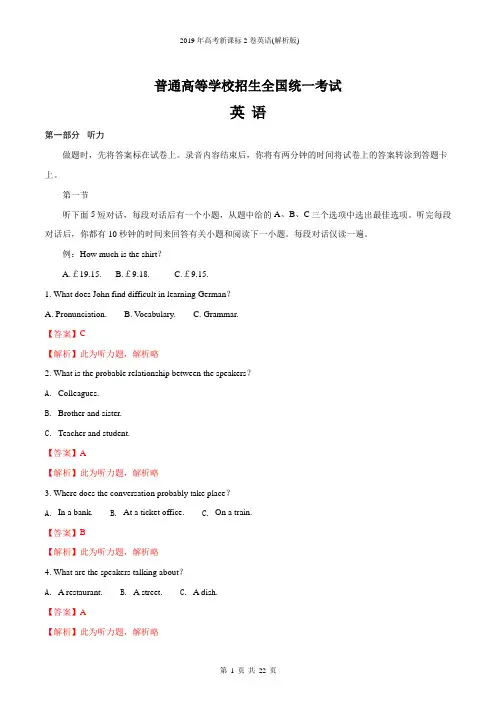
普通高等学校招生全国统一考试英语第一部分听力做题时,先将答案标在试卷上。
录音内容结束后,你将有两分钟的时间将试卷上的答案转涂到答题卡上。
第一节听下面5短对话,每段对话后有一个小题,从题中给的A、B、C三个选项中选出最佳选项。
听完每段对话后,你都有10秒钟的时间来回答有关小题和阅读下一小题。
每段对话仅读一遍。
例:How much is the shirt?A.£19.15.B.£9.18.C.£9.15.1. What does John find difficult in learning German?A. Pronunciation.B. Vocabulary.C. Grammar.【答案】C【解析】此为听力题,解析略2. What is the probable relationship between the speakers?A. Colleagues.B. Brother and sister.C. Teacher and student.【答案】A【解析】此为听力题,解析略3. Where does the conversation probably take place?A. In a bank.B. At a ticket office.C. On a train.【答案】B【解析】此为听力题,解析略4. What are the speakers talking about?A. A restaurant.B. A street.C. A dish.【答案】A【解析】此为听力题,解析略5. What does the woman think of her interview?A. It was tough.B. It was interesting.C. It was successful.【答案】C【解析】此为听力题,解析略第二节听下面5段对话或独白,每段对话或独白后有几个小题,从题中所给的A、B、C三个选项中选出最佳选项。
2019年普通高等学校招生全国统一考试(新课标II卷)英语答案解析(正式版)(解析版)
第Ⅰ卷第一部分听力(共两节,满分30分)略第二部分阅读理解(共两节,满分40分)AMy color television has given me nothing but a headache. I was able to buy it a little over a year ago because I had my relatives give me money for my birthday instea d of clothes that wouldn’t fit.I let a salesclerk fool me into buying a discontinued model. I realized this a day later, when I saw n ewspaper advertisements for the se t at seventy-five dollars less than I had paid. The set worked so beautiful when I first got it home that I would keep it on until stations signed off for the night. Fortunately, I didn’t get any channels showing all-night movies or I would never have gotten to bed.Then I started developing a problem with the set that involved static(静电) noise. For some reason, when certain shows switched into a commercial, a loud noise would sound for a few seconds. Gradually, this noise began to appear during a show, and to get rid of it, I had to change to another channel and then change it back. Sometimes this technique would not work, and I had to pick up the set and shake it to remove the sound. I actually began to build up my arm muscles(肌肉) shaking my set.When neither of these methods removed the static noise, I would sit helplessly and wait for the noise to go away. At last I ended up hitting the set with my first, and it stopped working altogether. My trip to the repair shop cost me $62, and the sit is working well now, but I keep expecting more trouble.21. Why did the author say he was fooled into buying the TV set?A.He got an older model than he had expected.B.He couldn’t return it when it was broken.C.He could have bought it at a lower price.D.He failed to find any movie shows on it.22. Which of the following an best replace the phrase “signed off” in paragraph 1?A.ended all their programsB.provided fewer channelsC.changed to commercialsD.showed all-night movies23. How did the author finally get this TV set working again?A.By shaking and hitting itB.By turning it on and offC.By switching channelsD.By having it repaired24. How does the author sound when telling the story?A.CuriousB.AnxiousC.CautiousD.Humorous【答案】21. C22. A[:23. D24. D22.A 词义推测题。
2019全国II卷英语高考真题-高考真题
2019年普通高等学校招生全国统一考试(全国卷II)英语注意事项:1.答卷前,考生务必将自己的姓名、准考证号填写在答题卡上。
2.回答选择题时,选出每小题答案后,用铅笔把答题卡上对应题目的答案标号涂黑。
如需改动,用橡皮擦干净后,再选涂其他答案标号。
回答非选择题时,将答案写在答题卡上,写在本试卷上无效。
3.考试结束后,将本试卷和答题卡一并交回。
第一部分听力(共两节,满分30分)做题时,先将答案标在试卷上。
录音内容结束后,你将有两分钟的时间将试卷上的答案转涂到答题卡上。
第一节(共5小题;每小题1.5分,满分7.5分)听下面5段对话。
每段对话后有一个小题,从题中所给的A、B、C三个选项中选出最佳选项。
听完每段对话后,你都有10秒钟的时间来回答有关小题和阅读下一小题。
每段对话仅读一遍。
例:How much is the shirt?A. £19.15.B. £9.18.C. £9.15.答案是C。
1. Where does the conversation probably take place?A. In a library.B. In a bookstore.C. In a classroom.2. How does the woman feel now?A. Relaxed.B. Excited.C. Tired.3. How much will the man pay?A. $20.B. $80.C. $100.4. What does the man tell Jane to do?A. Postpone his appointment.B. Meet Mr. Douglas.C. Return at 3 o’clock.5. Why would David quit his job?A. To go back to school.B. To start his own firm.C. To work for his friend. 第二节(共15小题;每小题1.5分,满分22.5分)听下面5段对话或独白。
(打印版)2019高考英语全国II卷真题全文讲解,精深翻译
National Matriculation English Test 2019 高考英语全国卷2AMy Favourite Books我最喜欢的书Jo Usmar is a writer for Cosmopolitan and co-author of the This Book Will series (系列) of lifestyle books. Here she picks her top reads.Jo Usmar是Cosmopolitan 公司的作家,也是This Book Will系列生活方式书的合著者。
在这里,她选出了她的最佳读物。
Matilda Roald Dahl《玛蒂尔达》罗尔德·达尔I once wrote a paper on the influence of fairy tales on Roald Dahl’s writing and it gave me a new appreciation for his strange and delightful worlds. Matilda’s battles with her cruel parents and the bossy headmistress, Miss Trunchbull, are equally fumy and frightening, but they’re also aspirational.我曾经写过一篇关于童话故事对罗尔德·达尔著作的影响的论文,这让我对他奇特而讨喜的文字有了新的认识。
玛蒂尔达同她残酷无情的父母以及专横跋扈的女校长之间的斗争也同样滑稽可笑却令人毛骨悚然,但是这些故事也很励志。
After Dark 《天黑以后》Haruki Murakami 村上春树It’s about two sisters –Eri, a model who either won’t or can’t stop sleeping, and Mari, a young student.这本书是关于两姐妹——艾莉和玛丽的故事,艾莉是一名模特,她是睡了就不愿醒或无法醒来,玛丽是一名年轻学生。
2019年高考英语真题(全国卷Ⅱ)含答案
2019年高考英语真题(全国卷Ⅱ)含答案2019 XXX)Englishns:1.Before answering the ns。
please write your name and XXX.2.For multiple choice ns。
use a pencil to mark the corresponding answer on the answer sheet。
If you need to change your answer。
XXX-multiple choice ns。
write your answer on the answer sheet。
Writing on this paper will not be counted.3.After the exam。
please turn in both the test XXX.Part 1 Listening (30 points in total)In this part。
you will hear 5 short XXX。
there will be a n with three ns。
Choose the best answer and mark it on the answer sheet。
You will have 10 seconds to answer each XXX.XXX: How much is the shirt?A。
£19.15 B。
£9.18 C。
£9.15XXX is C.1.Where does the XXX?A。
In a library B。
In a XXX2.How does the woman feel now?A。
XXX3.How much will the man pay?A。
$520 B。
$80 C。
$1004.What does the man tell Jane to do?A。
